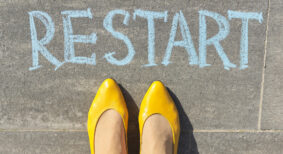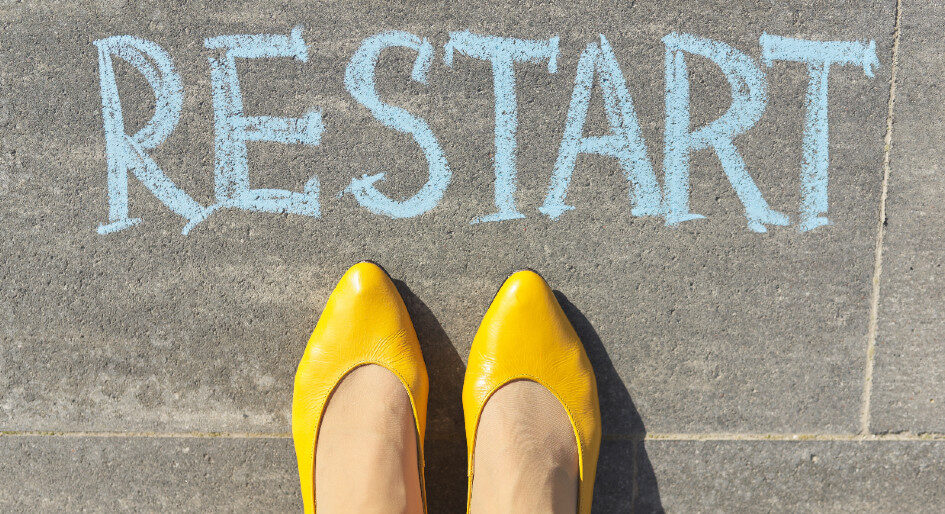A network of Ukrainian urban planners and designers is looking ahead to post-war recovery as the country endures an 11th month of destruction, displacement and uncertainty. Speaking during a recent webinar sponsored by the Canadian Urban Institute (CUI), members of the multidisciplinary collective, ReStart Ukraine, outlined some of their early steps to tackle the challenge of reimagining and reassembling a ravaged built environment.
“It’s strategic planning without knowing what will happen to you in two weeks. It gives you a certain additional psychological pressure,” acknowledged Oleksandr Shevchenko, an engineer and urbanist who founded the non-governmental organization shortly after the Russian invasion last winter. “There is so much unpredictability to what resources we have and when the war will be over. We try to focus on system change and we try to look at the bottlenecks.”
The group has devised a framework with nine interrelated action areas tied to a presumed recovery sequence — from applying temporary fixes and cleaning up the damage to envisioning new urban forms and engaging the public to securing financing and beginning to build. It’s now developing guidelines and implementation strategies for each of these components, and is seeking potential projects and opportunities to work collaboratively with local governments, community and residents’ groups.
Most cities and towns are still in an emergency response stage, dealing with a spectrum of upheaval. That includes mass destruction, such as the city of Mariupol where 90 per cent of buildings were damaged or destroyed, as well as sudden dramatic influxes of evacuees, such as the city of Lviv, which absorbed a 30 per cent population increase in the course of two weeks. More recently, relentless rocket attacks are bringing physical and emotional anguish upon a vast civilian population living well beyond the combat zone.
“We have productive regions; we have regions which are transitory; and we have regions that are damaged with the destruction of war,” noted Daria Borovyk an architect, urban planner and researcher with ReStart.
Shevchenko tallied the war’s fallout: one in four Ukrainians has been displaced; major economic sectors such as machinery manufacturing, coal mining and agriculture have been severely disrupted; longstanding trade routes and transportation corridors have been restricted or shut down; GDP has shrunk; and there has been an outflow of population. That follows the tumult of the previous four decades which saw the Chernobyl nuclear calamity, economic instability following the demise of the Soviet Union, repeated cycles of political conflict, Russian occupation of Crimea and the COVID-19 pandemic.
“It’s kind of a breaking point here with the start of a full-scale war, and that actually gave some spirit to ReStart Ukraine that, okay, we need something that will shape our cities for decades ahead so we are not always behind,” Shevchenko reflected. “We can make it through, not to a new crisis, but to a new breakthrough.”
That philosophy is reiterated on the organization’s website, which states: “It is surreal to shape big plans and devise ambitious strategies for their reconstruction as bombs continue to fall. However, we believe it gives hope and perspective.”
Looking for local input
Through that website, about 300 volunteers have signed on to provide input and expertise to help ReStart’s core group of practitioners consider how to honour what has been lost, improve on former inadequacies, bolster climate resilience and achieve low-carbon outcomes. Some initial priorities include collecting data to get a full picture of damage, identifying what can be restored or recycled and facilitating liveability for residents who have stayed and those who might be encouraged to return.
“People are our biggest capacity and value,” Borovyk affirmed. “Most of the people want to be safe and return, but safety is very subjective.”
For now, access to bomb shelters, a functioning school system and employment opportunities are typical key demands for viable residency. Looking to the future, Shevchenko and Borovyk anticipate the central government and private developers will be active in, and perhaps predisposed to attempt to control rebuilding programs. That partly underpins the rationale for urging local governments and community players to proactively think about their own visions of post-war recovery.
Shevchenko reports his group has yet to achieve much buy-in from central government officials, but has had more success forging relationships at the local level. Not unlike Canada, there has traditionally been some friction between the national and municipal governments and a distaste among many professionals and community activists for top-down urban planning exercises. That, too, was an impetus for founding ReStart.
“To be honest, we were — civic society and the professional community — we were pretty much sick of what processes were going on throughout our cities even without the war,” Shevchenko said. “Our first attempt, which was not very good, connecting to the ministries and to the government, is only the first attempt. Right now we are in a tight cooperation with the municipalities to show and to prove what are the innovations piloting we can do.”
“We, in turn, are trying to listen to local communities on the ground, not only implementing our ideas of what is best, but listening to what are the ideas of people because otherwise we don’t build anything meaningful for the community,” Borovyk concurred.
Nurturing respectful support for self-determination
That approach aligns with the Canadian Urban Institute’s outlook. Mary Rowe, the CUI’s president and chief executive officer, drew parallels to what she terms “prophetic cities” that have been suddenly forced to respond to devastating upheaval and warned of the potential consequences of “cataclysmic money” when outsiders control financial aid and commandeer decision-making. She called on Canadians to extend support that’s respectful of Ukrainians’ rightful place “in the driver’s seat”.
“What you’re embarking on here is such an extraordinary undertaking, it’s not going to happen fast, obviously. When I see the tools that you’re bringing to bear, you have this extraordinary opportunity, out of tragedy, to rebuild in a different kind of way,” Rowe observed. “How do we, as allies with you, find ways to bolster your capacity for your own self-determination?”
Bob Onyschuk, a former chair of CUI and the Canada-Ukraine Foundation, and Bohdan Wynnycky, a planning consultant, recounted their experiences as consultants in Ukraine in the 2005-2010 era, framing it as a potential resource for current efforts. Onyschuk contributed to decentralization strategies launched with Ukraine’s Orange Revolution, while Wynnycky consulted on various projects as Ukrainians navigated the learning curve of autonomy from the Soviet Union.
“Mostly we focused on transferring Canadian best practices and municipal government transparency, accountability and strategic planning, working directly with people on the ground and bringing in experts as needed to assist in that work,” Wynnycky said. “Today’s needs are different, but also still the same. We’re still talking about building local municipal capacity. In addition, we’re talking about Canadian expertise in post traumatic stress disorder and helping families deal with the war and losses. There are so many dimensions to recovery. We have to focus on the things we can contribute.”
More Canadians claim Ukrainian heritage than in almost any other nation (with the exception of Russia) outside Ukraine, and more than 70,000 recent evacuees have arrived via Canada’s temporary visa program. As well, Onyschuk cited major Canadian cities, including Toronto, Winnipeg and Vancouver, that are officially twinned with large Ukrainian counterparts such as Kyiv, Lviv and Odessa.
“We do have some infrastructure that we could be using better to facilitate this kind of professional exchange,” Rowe remarked.
Outreach to CUI and its networks is part of a broader effort to forge partnerships within and beyond Ukraine. Shevchenko predicts the governments, organizations and individuals currently providing humanitarian aid will also be important in the post-war era and he’s aiming to build and entrench his group’s credibility.
“We want to make sure the Ukrainian recovery includes not only dialogue to the Ukrainian government, but also to the Ukrainian professional community, civic society and the municipalities as well, to make it balanced,” he said. “One of the challenges we have is the absorption capacity for future plans, and to have the right projects in the right places with the right personnel, not only conceptionally, but hands-on.”
“Our very existence is about being ready to handle all the resources that will come, and try to navigate through it and give it the right path for local communities,” Borovyk added.
Barbara Carss is editor-in-chief of Canadian Property Management.







